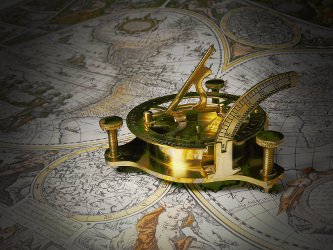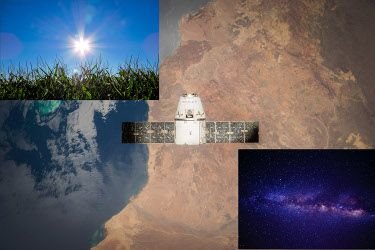Finding our exact position in time and space has, historically, always been a matter of great importance to us. For people to work toward a common objective, they have to—more or less simultaneously—meet at particular places and moments in time. But how did our ability to do this improve throughout the ages? As it turns out, building clocks and watching the heavens have taken us a long way in that direction.

Without clocks, there’d be far less gatherings of this kind
Although I have no evidence to back this up, I suppose the first means of organizing meetings depended on oral communication and time estimation based on the sun’s position in the sky; basically people agreed meeting at a convenient place and time. If you think about it, picking a mutually convenient time is quite a hard thing to pull off when there are many people and no clocks.
Perhaps the best you can do in this case, is pick among three events: sunrise, (local) noon, and sunset. Sunrise is particularly useful in this regard, as you can just look for first light; i.e., the exact moment sun-rays pass over your horizon. However, that’s not as accurate as you might think, as it depends on your elevation and position on earth. For instance, if you’re on top of a mountain, you’ll see first light earlier than someone at sea level.

Can you imagine depending on the sun’s position instead of clocks?
At this point most people give up, because they realize that, yes indeed, elevation is a parameter that influences how accurately people can meet in the absence of clocks. Big deal, there’s probably tons of other parameters that influence the error term, right? Well, I beg to differ; I think difference in elevation, h, is a very important parameter, so examining it more closely will reveal something interesting.

Intellectual boldness isn’t as cool as climbing a mountain, I know
Let’s assume a worst-case scenario of two young lovers, Alice and Bob, who want to meet. They’re madly in love, but live in separate villages—Alice at the base and Bob near the top of a mountain—where clocks are unheard of. They agree to meet at a small grove halfway up the mountain at first light, but our protagonists live at different elevations. How much longer will Bob wait until his beloved shows up?
The moment he sees first light, Bob’s gaze traces an imaginary line that grazes over the edge of his visible horizon, extending into deep space. At the same time, Alice still anxiously awaits for first light to appear in the east. In fact, she won’t won’t see first light until a time t after Bob starts climbing down the mountain.

Mountaintops see first light before the sea does
So how big is t? Well, if you think about it, it’s basically the extra angular distance, θ, the sun has to traverse before appearing in Alice’s field of view. To find θ, we have to calculate the angle at which the gazes (upon first light) of our two protagonists meet. If you work out the geometry, it turns out that
where Rearth ~ 5,000 km (ballpark numbers people, don’t freak out) is the earth’s radius.

This is turning out to be quite a romantic tale, isn’t it?
So basically t is equal to the time needed for the sun to traverse about 1 degree in the sky. Since it does a complete rotation (360 degrees) in 24 hours, the sun has an (average) angular speed ω ~ (360/24) deg/hour ~ 10 deg/hour. Putting it all together, we get
This is pretty remarkable: Bob has to wait about 5 minutes before Alice comes along. And that’s essentially the kind of accuracy restricting you in the absence of clocks.

Feeling good about having clocks yet?
When you do have clocks, it all comes down to the accuracy with which they’re synchronized. Especially for early pendulum-type clocks, the problem is that, given sufficient time, their readings diverge from the actual positions of the sun in the sky. (This is mostly caused by daily changes in temperature, hence length, and therefore oscillation period.) Errors of these kind keep piling up, unless you do something to correct it mechanically.
When the time-keeping error reaches 5 minutes or so, clock synchronization becomes pointless. So, how slowly should clocks diverge to remain synchronized to a sufficient degree of accuracy? This basically depends on how long you want to keep them synchronized: Any uncorrected clock has a finite rate at which it piles up its own time-keeping error, hence it can be used to an accuracy ≲ 1 minute (i.e., better than no clocks at all) for a finite period of time.

Heavy things swinging back-and-forth once made for great clocks
The point at which accurate clockwork became essential, was during the so-called Age of Discovery (AoD) in 15th–18th century Europe (about which I recently wrote), when European colonizers sailed across oceans in search of profit. When you’re traversing the seas, you’d like know your position to at least 10% accuracy. Since oceans span a good fraction (~ 10%) of the earth’s circumference, I’d say the minimum required accuracy is s ~ 1,000 km. But how can you determine your position on earth?

Can you imagine crossing oceans without the Internet or GPS?
Your longitude is pretty easy to determine using the stars (e.g., the North Star), so latitude is the tricky part. To determine latitude, you can compare the time between two fixed celestial events; e.g., local noon, and noon defined at some reference position like your hometown. As in Alice and Bob’s case, we need to calculate some kind of angle θ. Assuming a purely east-to-west (or vice-versa) voyage, it turns out that
That’s actually worse than word-of-mouth accuracy (~ 1 deg). Given that trans-oceanic voyages with sailing ships lasted for ~ 100 days, an assumed ~ 10% accuracy means knowing your rough position every week or so. Ideally, you’d like a fairly accurate report on a daily basis, which means increasing the accuracy to ~ 1%; Reports on an hourly basis—which requires an accuracy t ~ 0.1 min ~ 10 sec—puts you at a clear advantage, requiring a level of sophistication well beyond word-of-mouth complexity.

Surprisingly enough, competent sailing is complicated stuff
Our ability to coordinate our actions over huge distances is thus enabled by accurate time-keeping, which, historically, was achieved by looking at the heavens. Today, we can basically determine our position within s ~ 1 m using satellites in (geosynchronous) orbit. Comparing that to an accuracy t ~ 10 sec achieved during the AoD—which is equivalent to s ~ 10 km—modern geolocation methods are more accurate by a factor of 10,000: That’s millisecond precision, which even professional videogamers can’t consciously perceive.

We’ve always looked at the heavens to find our position in the Cosmos
So, next time you use Google Maps, give a little thought to the accuracy involved in achieving the miraculous precision required. Remember that this is all made possible by scientific study of the heavens. More important still, remember that enjoying the fruits of applied scientific knowledge is a privilege, not a right.
Πολυ καλο, βαλε steemstem στα tag, πιστευω θα βοηθησει...
Ευχαριστώ φίλε! Αν και εκτιμώ τις συμβουλές σου έως τώρα, πρέπει να σου πω πως δεν γράφω για να με διαβάσει πολύς κόσμος. Γράφω γιατί θέλω να βγάλω διάφορες σκέψεις και απόψεις από μέσα μου. Δεν έχω σκοπό να γίνω μηχανή που γράφει μικρά αρθράκια με πιασάρικο υλικό για να βγάλω λεφτά: Έως τώρα γράφω ό,τι θέλω, όποτε θέλω και όπως θέλω. Είμαι φυσικά πάντα ανοιχτός σε οποιαδήποτε μορφή κριτικής όσον αφορά το περιεχόμενο των επιχειρημάτων :)
Καταλαβαίνω φυσικά γιατί μου δίνεις τέτοιες συμβουλές: Γιατί αυτό κυνηγάνε οι περισσότεροι δημιουργοί εδώ στο Steemit και αυτό είναι απόλυτα σεβαστό. Εκτιμώ λοιπόν την καλοσύνη σου και σ' ευχαριστώ. Το δικό μου στιλ είναι όμως αρκετά διαφορετικό, όπως θα έχεις ίσως προσέξει. Στοιχηματίζω πως ο περισσότερος κόσμος δεν μπορεί να καταλάβει αυτά που γράφω, για λόγους που νομίζω είναι λίγο-πολύ προφανείς: Έχει αρκετά μαθηματικά, φυσική, επιχειρηματολογία και λογική. Επίσης είναι σχετικά μεγάλα σε μέγεθος, οπότε είναι απόλυτα λογικό να μην ενδιαφέρεται ο μέσος αναγνώστης. Είμαι ΟΚ μ' αυτό, δεν ψάχνω για spotlight.
Σεβαστό αυτό που μου λες, αλλά προσωπική μου γνώμη είναι ότι όταν γράφεις το άρθρο σου σε ένα social media προφανώς και απευθύνεσαι στον μέσο αναγνώστη αλλιώς ας πούμε θα το ανέβαζες σε ένα επιστημονικό περιοδικό του πεδίου σου. Όσον αφορά το tag, στο είπα γτ μπορεί να υπάρχουν άτομα στο steemstem που πραγματικά να ενδιαφέρονται για το άρθρο σου και απλώς να μην μπορούν να το εντοπίσουν μέσα στα χιλιάδες άλλα που κυκλοφορούν. Τέλος πάντων συνέχισε να γράφεις όπως θές και όποτε θές!!! Blockchain is freedom!!! :)
Εδώ διαφωνούμε κάθετα, φίλε: Η άποψη ότι όταν είσαι content creator σ' ένα social media platform πρέπει ν' απευθύνεσαι σ' ευρύ κοινό δεν είναι λογικό επακόλουθο. Αυτό είναι μια διαστρεβλωμένη εντύπωση που έχει γαλουχηθεί από συγκεκριμένα platforms όπως YouTube, Facebook και Twitter που βασίζονται σε attention economies.
Το ότι ο περισσότερος κόσμος στα δημοφιλέστερα social media είναι γλείφτες και παρακαλάνε για views, (re-) shares, likes, subscriptions κτλ. επειδή μόνο έτσι το attention economy τους επιβραβεύει με δημοτικότητα και χρήματα, δεν σημαίνει πως έτσι πρέπει να λειτουργούν τα social media. Ειδικά αν κάποιο άτομο δημιουργεί υλικό που πάει εξόφθαλμα αντίθετα στην πεπατημένη, χωρίς όμως να παραπονιέται για έλλειψη δημοτικότητας, ακριβώς επειδή έχει το απαιτούμενο επίπεδο αυτογνωσίας.
Γενικά πάντως η πρόταση
είναι λιγάκι ακραία ρε συ μαν. (Σόρι που τα λέω έτσι ντόμπρα, έτσι μιλάω και σαν άνθρωπος και δεν έχω κάτι εναντίον σου.) Δηλαδή ή πηγαίνεις με τη μάζα ή γράφεις papers; Έχω (συν- ) γράψει και απ' αυτά, άρα δεν γράφω εδώ για να κάνω έρευνα ή να το παίξω έξυπνος. Μπούρδες γράφω όπως και η πλειοψηφία, απλά το στιλ μου είναι κάπως αντισυμβατικό.
Το Steemit μου προσφέρει μια πολύ φιλικότερη—για να μην αναφέρω πλησιέστερη στη γενικότερη φιλοσοφία μου—πλατφόρμα για ν' αδειάζω τις σκέψεις μου. Έριξα πάντως μια ματιά στο steemstem και παρά το ελαφρύ κράξιμο που έριξα έως τώρα—περισσότερο για τη γενικότερη κατάντια των social media—θ' ακολουθήσω τη συμβουλή σου γιατί είδα πως ασχολούνται μ' επιστήμες. Σ' ευχαριστώ λοιπόν γι' αυτό :)
Γενικά σαν επιστήμονας να ξέρεις πως έχω πολύ χαμηλές προσδοκίες απ' τη συντριπτική πλειοψηφία των science communicators: Αφενός μεν δεν καταλαβαίνουν οι ίδοι σε βάθος το αντικείμενο που συζητάνε και αφετέρου το υπεραπλουστεύουν τόσο πολύ—για να γίνει "φιλικό" προς μέσο αναγνώστη—που χάνεται η ουσία.
Νομίζω το κλείσιμό σου ταιριάζει γάντι κι εδώ:
Εδώ είμαι μαζί σου 100%, εκτός κι αν η απληστία μας βρει τρόπο να διαλύσει και το blockchain...
Μόνο μέσα σε μια ιδανική κοινωνία όπου πλέον το χρήμα δεν θα παίζει ρόλο, θα υπάρχει πλήρης ισότητα των ανθρώπων τόσο στην μόρφωση όσο και στην παροχή των υλικών αγαθών τότε και μόνο τότε βλέπω και τα social media να περνάνε σε μια νέα φάση ιδανικής λειτουργίας. Όταν η ίδια η κοινωνία είναι βασισμένη σε λανθασμένους κανόνες δεν μπορείς να ζητάς απο τα social media να λειτουργούν αλλιώς, εκφράζουν την μάζα, και αυτή η αντισυμβατικότητα για την οποία μιλάς, φαινόμενο μαζοποίησης είναι αν το καλοσκεφτείς. Όταν λοιπόν μπαίνεις μέσα όχι μόνο δεν εκφράζεις και κάνεις αυτά που θές αλλά γίνεσαι και εσύ ένα με την μάζα, μπαίνεις στον χορό και χορεύεις να το πώ λαικά. Αν πιστεύεις ότι το steemit σε εκφράζει κάπως περισσότερο ώστε να πείς αυτά που σκέφτεσαι, σε λίγο καιρό θα αλλάξεις γνώμη, δεν έχει καμία σχέση με το πραγματικό όραμα του blockchain αυτό το δημιούργημα, τα κατασκευαστικά προβλήματα του steemit είναι πολλά, έρχονται νέες πλατφόρμες μέσα απο το blockchain που θα φέρουν την πραγματική ελευθερία έκφρασης...
Congratulations @anasepit90! You received a personal award!
Click here to view your Board
Congratulations @anasepit90! You received a personal award!
You can view your badges on your Steem Board and compare to others on the Steem Ranking
Vote for @Steemitboard as a witness to get one more award and increased upvotes!